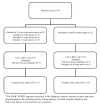Restorative yoga for women with breast cancer: findings from a randomized pilot study
- PMID: 19242916
- PMCID: PMC3930083
- DOI: 10.1002/pon.1503
Restorative yoga for women with breast cancer: findings from a randomized pilot study
Abstract
Objectives: Restorative yoga (RY) is a gentle type of yoga that may be beneficial for cancer patients and post-treatment survivors. Study goals were: to determine the feasibility of implementing a RY intervention for women with breast cancer; and to examine group differences in self-reported emotional, health-related quality of life, and symptom outcomes.
Methods: Women with breast cancer (n=44; mean age 55.8 years) enrolled in this study; 34% were actively undergoing cancer treatment. Study participants were randomized to the intervention (10 weekly 75-minute RY classes) or a waitlist control group. Participants completed questionnaires at Week 0 (baseline) and Week 10 (immediately post-intervention for the yoga group).
Results: Group differences favoring the yoga group were seen for mental health, depression, positive affect, and spirituality (peace/meaning). Significant baseline*group interactions were observed for negative affect and emotional well-being. Women with higher negative affect and lower emotional well-being at baseline derived greater benefit from the yoga intervention compared to those with similar values at baseline in the control group. The yoga group demonstrated a significant within-group improvement in fatigue; no significant difference was noted for the control group.
Conclusions: Although limited by sample size, these pilot data suggest potential benefit of RY on emotional outcomes and fatigue in cancer patients. This study demonstrates that a RY intervention is feasible for women with breast cancer; implications for study design and implementation are noted with an emphasis on program adoption and participant adherence.
(c) 2009 John Wiley & Sons, Ltd.
References
-
- Boon HS, Olatunde F, Zick SM. Trends in complementary/alternative medicine use by breast cancer survivors: comparing survey data from 1998 and 2005. BMC Women’s Health. 2007;7(4) Available at http://www.biomedcentral.com/1472-6874/7/4, http://dx.doi.org/10.1186/1472-6874-7-4. - DOI - PMC - PubMed
-
- Matthews AK, Sellergren SA, Huo D, List M, Fleming G. Complementary and alternative medicine use among breast cancer survivors. J Altern Complement Med. 2007;13(5):555–562. http://dx.doi.org/10.1089/acm.2007.03-9040. - DOI - PubMed
-
- Ashikaga T, Bosompra K, O’Brien P, Nelson L. Use of complementary and alternative medicine by breast cancer patients: prevalence, patterns and communication with physician. Support Care Cancer. 2002;10:542–548. http://dx.doi.org/10.1007/s00520-002-0356-1. - DOI - PubMed
-
- Ni H, Simile C, Hardy AM. Utilization of complementary and alternative medicine by United States adults: Results from the 1999 National Health Interview Survey. Med Care. 2002;40:353–358. - PubMed
-
- Wolsko PM, Eisenberg DM, Davis RB, et al. Use of mind-body medical therapies. J Gen Intern Med. 2004;19:43–50. http://dx.doi.org/10.1111/j.1525-1497.2004.21019.x. - DOI - PMC - PubMed
Publication types
MeSH terms
Grants and funding
LinkOut - more resources
Full Text Sources
Medical


